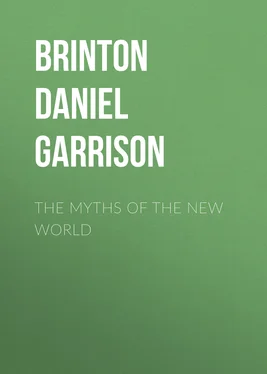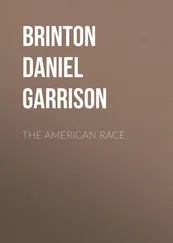Daniel Brinton - The Myths of the New World
Здесь есть возможность читать онлайн «Daniel Brinton - The Myths of the New World» — ознакомительный отрывок электронной книги совершенно бесплатно, а после прочтения отрывка купить полную версию. В некоторых случаях можно слушать аудио, скачать через торрент в формате fb2 и присутствует краткое содержание. Жанр: foreign_prose, История, Старинная литература, Мифы. Легенды. Эпос, foreign_edu, foreign_antique, на английском языке. Описание произведения, (предисловие) а так же отзывы посетителей доступны на портале библиотеки ЛибКат.
- Название:The Myths of the New World
- Автор:
- Жанр:
- Год:неизвестен
- ISBN:нет данных
- Рейтинг книги:5 / 5. Голосов: 1
-
Избранное:Добавить в избранное
- Отзывы:
-
Ваша оценка:
- 100
- 1
- 2
- 3
- 4
- 5
The Myths of the New World: краткое содержание, описание и аннотация
Предлагаем к чтению аннотацию, описание, краткое содержание или предисловие (зависит от того, что написал сам автор книги «The Myths of the New World»). Если вы не нашли необходимую информацию о книге — напишите в комментариях, мы постараемся отыскать её.
The Myths of the New World — читать онлайн ознакомительный отрывок
Ниже представлен текст книги, разбитый по страницам. Система сохранения места последней прочитанной страницы, позволяет с удобством читать онлайн бесплатно книгу «The Myths of the New World», без необходимости каждый раз заново искать на чём Вы остановились. Поставьте закладку, и сможете в любой момент перейти на страницу, на которой закончили чтение.
Интервал:
Закладка:
This view, which has obtained without question in every work on the native religions of America, has arisen partly from habits of thought difficult to break, partly from mistranslations of native words, partly from the foolish axiom of the early missionaries, “The gods of the gentiles are devils.” Yet their own writings furnish conclusive proof that no such distinction existed out of their own fancies. The same word ( otkon ) which Father Bruyas employs to translate into Iroquois the term “devil,” in the passage “the Devil took upon himself the figure of a serpent,” he is obliged to use for “spirit” in the phrase, “at the resurrection we shall be spirits,” 56 56 Bruyas, Rad. Verb. Iroquæorum , p. 38.
which is a rather amusing illustration how impossible it was by any native word to convey the idea of the spirit of evil. When, in 1570, Father Rogel commenced his labors among the tribes near the Savannah River, he told them that the deity they adored was a demon who loved all evil things, and they must hate him; whereupon his auditors replied, that so far from this being the case, whom he called a wicked being was the power that sent them all good things, and indignantly left the missionary to preach to the winds. 57 57 Alcazar, Chrono-historia de la Prov. de Toledo , Dec. iii., Año viii., cap. iv: Madrid, 1710. This rare work contains the only faithful copies of Father Rogel’s letters extant. Mr. Shea, in his History of Catholic Missions, calls him erroneously Roger.
A passage often quoted in support of this mistaken view is one in Winslow’s “Good News from New England,” written in 1622. The author says that the Indians worship a good power called Kiehtan, and another “who, as farre as wee can conceive, is the Devill,” named Hobbamock, or Hobbamoqui. The former of these names is merely the word “great,” in their dialect of Algonkin, with a final n , and is probably an abbreviation of Kittanitowit, the great manito, a vague term mentioned by Roger Williams and other early writers, not the appellation of any personified deity. 58 58 It is fully analyzed by Duponceau, Langues de l’Amérique du Nord , p. 309.
The latter, so far from corresponding to the power of evil, was, according to Winslow’s own statement, the kindly god who cured diseases, aided them in the chase, and appeared to them in dreams as their protector. Therefore, with great justice, Dr. Jarvis has explained it to mean “the oke or tutelary deity which each Indian worships,” as the word itself signifies. 59 59 Discourse on the Religion of the Ind. Tribes of N. Am. , p. 252 in the Trans. N. Y. Hist. Soc.
So in many instances it turns out that what has been reported to be the evil divinity of a nation, to whom they pray to the neglect of a better one, is in reality the highest power they recognize. Thus Juripari, worshipped by certain tribes of the Pampas of Buenos Ayres, and said to be their wicked spirit, is in fact the only name in their language for spiritual existence in general; and Aka-kanet, sometimes mentioned as the father of evil in the mythology of the Araucanians, is the benign power appealed to by their priests, who is throned in the Pleiades, who sends fruits and flowers to the earth, and is addressed as “grandfather.” 60 60 Mueller, Amer. Urreligionen , pp. 265, 272, 274. Well may he remark: “The dualism is not very striking among these tribes;” as a few pages previous he says of the Caribs, “The dualism of gods is anything but rigidly observed. The good gods do more evil than good. Fear is the ruling religious sentiment.” To such a lame conclusion do these venerable prepossessions lead. “ Grau ist alle Theorie .”
The Çupay of the Peruvians never was, as Prescott would have us believe, “the shadowy embodiment of evil,” but simply and solely their god of the dead, the Pluto of their pantheon, corresponding to the Mictla of the Mexicans.
The evidence on the point is indeed conclusive. The Jesuit missionaries very rarely distinguish between good and evil deities when speaking of the religion of the northern tribes; and the Moravian Brethren among the Algonkins and Iroquois place on record their unanimous testimony that “the idea of a devil, a prince of darkness, they first received in later times through the Europeans.” 61 61 Loskiel, Ges. der Miss. der evang. Brueder , p. 46.
So the Cherokees, remarks an intelligent observer, “know nothing of the Evil One and his domains, except what they have learned from white men.” 62 62 Whipple, Report on the Ind. Tribes , p. 33: Washington, 1855. Pacific Railroad Docs.
The term Great Spirit conveys, for instance, to the Chipeway just as much the idea of a bad as of a good spirit; he is unaware of any distinction until it is explained to him. 63 63 Schoolcraft, Indian Tribes , i. p. 359.
“I have never been able to discover from the Dakotas themselves,” remarks the Rev. G. H. Pond, who had lived among them as a missionary for eighteen years, 64 64 In Schoolcraft, Ibid. , iv. p. 642.
“the least degree of evidence that they divide the gods into classes of good and evil, and am persuaded that those persons who represent them as doing so, do it inconsiderately, and because it is so natural to subscribe to a long cherished popular opinion.”
Very soon after coming in contact with the whites, the Indians caught the notion of a bad and good spirit, pitted one against the other in eternal warfare, and engrafted it on their ancient traditions. Writers anxious to discover Jewish or Christian analogies, forcibly construed myths to suit their pet theories, and for indolent observers it was convenient to catalogue their gods in antithetical classes. In Mexican and Peruvian mythology this is so plainly false that historians no longer insist upon it, but as a popular error it still holds its ground with reference to the more barbarous and less known tribes.
Perhaps no myth has been so often quoted in its confirmation as that of the ancient Iroquois, which narrates the conflict between the first two brothers of our race. It is of undoubted native origin and venerable antiquity. The version given by the Tuscarora chief Cusic in 1825, relates that in the beginning of things there were two brothers, Enigorio and Enigohahetgea, names literally meaning the Good Mind and the Bad Mind. 65 65 Or more exactly, the Beautiful Spirit, the Ugly Spirit. In Onondaga the radicals are onigonra , spirit, hio beautiful, ahetken ugly. Dictionnaire Français-Onontagué, édité par Jean-Marie Shea : New York, 1859.
The former went about the world furnishing it with gentle streams, fertile plains, and plenteous fruits, while the latter maliciously followed him creating rapids, thorns, and deserts. At length the Good Mind turned upon his brother in anger, and crushed him into the earth. He sank out of sight in its depths, but not to perish, for in the dark realms of the underworld he still lives, receiving the souls of the dead and being the author of all evil. Now when we compare this with the version of the same legend given by Father Brebeuf, missionary to the Hurons in 1636, we find its whole complexion altered; the moral dualism vanishes; the names Good Mind and Bad Mind do not appear; it is the struggle of Ioskeha, the White one, with his brother Tawiscara, the Dark one, and we at once perceive that Christian influence in the course of two centuries had given the tale a meaning foreign to its original intent.
So it is with the story the Algonkins tell of their hero Manibozho, who, in the opinion of a well-known writer, “is always placed in antagonism to a great serpent, a spirit of evil.” 66 66 Squier, The Serpent Symbol in America .
It is to the effect that after conquering many animals, this famous magician tried his arts on the prince of serpents. After a prolonged struggle, which brought on the general deluge and the destruction of the world, he won the victory. The first authority we have for this narrative is even later than Cusic; it is Mr. Schoolcraft in our own day; the legendary cause of the deluge as related by Father Le Jeune, in 1634, is quite dissimilar, and makes no mention of a serpent; and as we shall hereafter see, neither among the Algonkins nor any other Indians, was the serpent usually a type of evil, but quite the reverse. 67 67 Both these legends will be analyzed in a subsequent chapter, and an attempt made not only to restore them their primitive form, but to explain their meaning.
Интервал:
Закладка:
Похожие книги на «The Myths of the New World»
Представляем Вашему вниманию похожие книги на «The Myths of the New World» списком для выбора. Мы отобрали схожую по названию и смыслу литературу в надежде предоставить читателям больше вариантов отыскать новые, интересные, ещё непрочитанные произведения.
Обсуждение, отзывы о книге «The Myths of the New World» и просто собственные мнения читателей. Оставьте ваши комментарии, напишите, что Вы думаете о произведении, его смысле или главных героях. Укажите что конкретно понравилось, а что нет, и почему Вы так считаете.












